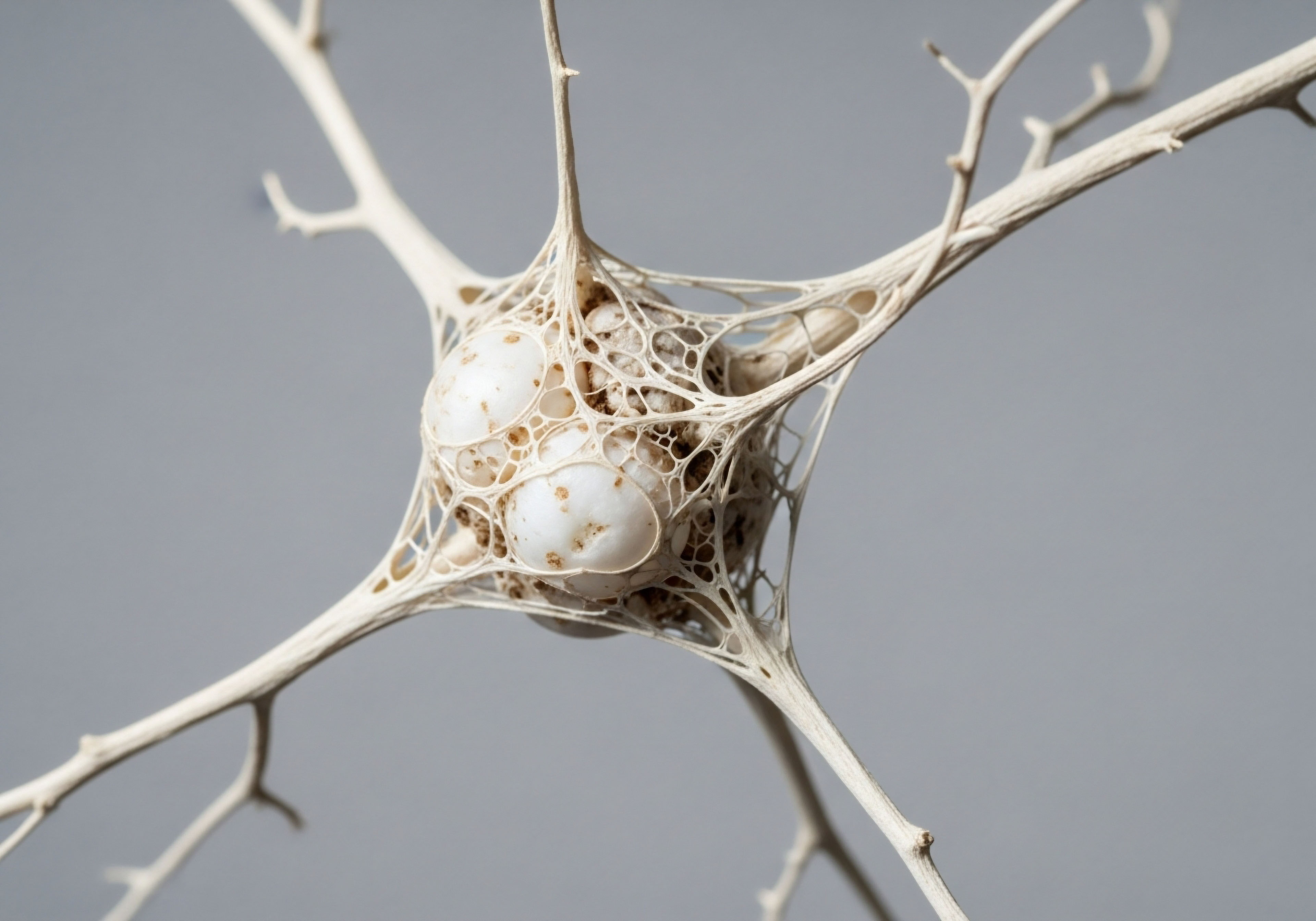

Fundamentals of Biological Data Protection
Consider the journey you undertake to understand your own body, particularly when seeking to recalibrate hormonal balance or optimize metabolic function. This deeply personal exploration often involves sharing intimate biological data ∞ blood markers, genetic predispositions, even lifestyle nuances ∞ with trusted wellness programs.
This information, a detailed biological narrative, holds the potential to unlock profoundly personalized protocols, guiding you toward vitality and function without compromise. Simultaneously, this very data, when aggregated and ethically handled, becomes a powerful catalyst for scientific discovery, advancing collective understanding of human physiology.
The cornerstone of this collective learning, without compromising individual biological narratives, rests upon the meticulous practice of data anonymization. This process transforms personal health information into a form where individual identities remain shielded, even as the underlying biological patterns and responses contribute to broader research. The objective extends beyond mere compliance; it establishes a foundation of trust, allowing individuals to participate in the advancement of health science with absolute confidence in the protection of their sensitive information.
Data anonymization safeguards individual biological narratives while enabling the collective advancement of personalized wellness research.
Wellness programs, operating at the vanguard of personalized health, gather data that is inherently sensitive. Hormonal profiles, for instance, reflect the intricate dance of the endocrine system, revealing individual responses to environmental factors, dietary interventions, and therapeutic strategies. Protecting this granularity of information is paramount, as any potential for re-identification could undermine the very trust essential for robust health initiatives.
The techniques employed ensure that while the patterns of, say, testosterone fluctuations or thyroid hormone metabolism across a large cohort become discernible for research, your specific markers remain inextricably detached from your identity.
This careful separation of identity from information permits the study of complex interactions within the human system, such as how specific lifestyle interventions impact the hypothalamic-pituitary-gonadal (HPG) axis or how metabolic markers respond to different nutritional approaches. Such research, driven by anonymized data, moves the field of personalized wellness forward, generating evidence-based insights that can refine future protocols and benefit countless individuals seeking their own path to optimal health.


Applying Anonymization to Personalized Wellness Protocols
As you progress in your understanding of personal health, the mechanisms by which wellness programs protect your data become increasingly relevant. The transformation of raw biological data into a research-ready, anonymized format involves several sophisticated techniques, each calibrated to balance the competing demands of privacy and data utility. This equilibrium ensures that while the integrity of your personal information remains unassailable, the collective insights derived from aggregated data retain their scientific value.

Protecting Your Biological Footprint
One foundational approach involves pseudonymization , where direct identifiers such as names or addresses are replaced with artificial aliases or codes. This method retains a link to the individual for internal program management or re-identification under strict, controlled circumstances, such as for a specific clinical follow-up, but severs the direct connection for research purposes.
Another technique, generalization , involves broadening specific data points. For instance, an exact birth date might become a birth year range, or a precise geographical location might transform into a broader region. Similarly, suppression removes highly unique data points that could inadvertently lead to re-identification, such as a rare disease diagnosis in a very small demographic group.
Pseudonymization, generalization, and suppression are fundamental techniques for safeguarding individual data in health research.
These methods collectively reduce the risk of re-identification, a persistent challenge in health data research where combining seemingly innocuous data points from various sources can inadvertently reveal an individual’s identity. Robust wellness programs employ a multi-layered defense, recognizing that data security is a dynamic, ongoing process rather than a static endpoint. This includes regular audits and the continuous refinement of anonymization protocols.

Regulatory Frameworks Guiding Data Stewardship
The ethical imperative to protect sensitive health data is enshrined in comprehensive regulatory frameworks worldwide. In the United States, the Health Insurance Portability and Accountability Act (HIPAA) sets stringent standards for protecting Protected Health Information (PHI), mandating specific de-identification methods for data used without individual consent.
Across Europe, the General Data Protection Regulation (GDPR) establishes broad principles for data processing, emphasizing transparency, data minimization, and secure data storage. These regulations are not merely legal hurdles; they serve as critical blueprints for responsible data stewardship, ensuring that wellness programs operate with the highest ethical standards.
Anonymized data becomes a powerful engine for understanding the effectiveness of specific clinical protocols. Consider the refinement of Testosterone Replacement Therapy (TRT) for men, which often involves weekly intramuscular injections of Testosterone Cypionate, alongside Gonadorelin and Anastrozole.
Anonymized longitudinal studies allow researchers to observe population-level responses to varying dosages, assess the long-term impact on metabolic markers, and identify subtle side effect profiles without ever knowing the specific individuals involved. Similarly, research into female hormonal balance protocols, including Testosterone Cypionate subcutaneous injections or Progesterone use, benefits immensely from large, anonymized datasets, leading to more tailored and effective interventions for conditions such as peri-menopause and post-menopause.
The application extends to Growth Hormone Peptide Therapy, where peptides like Sermorelin, Ipamorelin, or Tesamorelin are used for anti-aging, muscle gain, or sleep improvement. Anonymized data facilitates the analysis of efficacy across different age groups and activity levels, contributing to an evidence base that supports personalized peptide regimens. This systematic approach to data protection allows for continuous learning and adaptation within personalized wellness, ensuring that the collective wisdom derived from shared experiences enhances individual outcomes.


Advanced Anonymization Paradigms for Endocrine Research
For those seeking a deeper understanding of the scientific rigor underpinning data privacy in wellness research, the methodologies extend into sophisticated mathematical and computational paradigms. The complex interplay of the endocrine system, with its myriad feedback loops and metabolic pathways, generates highly dimensional and interconnected data. Extracting meaningful insights from this biological richness for research, while absolutely preserving individual privacy, necessitates advanced anonymization techniques that transcend simple de-identification.

Quantifying Privacy with Advanced Models
Early syntactic privacy models, such as k-anonymity , established a foundational principle ∞ each individual’s record within a dataset must be indistinguishable from at least k-1 other records concerning certain quasi-identifiers (e.g. age, zip code, diagnosis). This prevents direct re-identification.
However, k-anonymity alone does not guard against attribute disclosure, where sensitive information about an individual can be inferred even if their identity remains unknown within a group. This led to the development of l-diversity , which ensures that each k -anonymous group contains at least l distinct sensitive attribute values, thereby diversifying the information within the group.
Further refinement brought forth t-closeness , addressing limitations of l-diversity by requiring that the distribution of sensitive attributes within each k -anonymous group closely mirrors the distribution in the overall dataset, thus minimizing inference attacks.
A more robust, semantic privacy model gaining prominence is differential privacy. This approach adds carefully calibrated statistical noise to the data or query results, ensuring that the inclusion or exclusion of any single individual’s data record does not significantly alter the outcome of an analysis.
Differential privacy offers strong, provable privacy guarantees, making it resilient against adversaries with extensive background knowledge. Its application in endocrine research permits the aggregation of sensitive hormonal data, such as detailed diurnal cortisol rhythms or intricate insulin sensitivity profiles, allowing for population-level statistical analyses without revealing the unique patterns of any single participant. The inherent trade-off lies in balancing the magnitude of added noise ∞ too much noise diminishes data utility, while too little compromises privacy.
| Technique | Primary Mechanism | Key Privacy Benefit | Potential Limitation |
|---|---|---|---|
| Pseudonymization | Replacing direct identifiers with artificial aliases | Removes direct links to identity | Re-identification possible with access to key |
| Generalization | Broadening specific data points (e.g. age ranges) | Increases indistinguishability within groups | Reduces data granularity and utility |
| k-Anonymity | Ensuring each record is indistinguishable from k-1 others | Protects against identity disclosure | Vulnerable to attribute disclosure attacks |
| l-Diversity | Ensuring diversity of sensitive attributes within k -anonymous groups | Protects against attribute disclosure | Can be difficult to achieve with high utility |
| Differential Privacy | Adding statistical noise to data or query results | Provides strong, provable privacy guarantees | Can reduce data utility, complex implementation |

Systems Biology and Data-Driven Insights
The intricate architecture of the human endocrine system, a complex web of hormones, glands, and feedback mechanisms, demands a systems-biology perspective for comprehensive understanding. Research into the hypothalamic-pituitary-adrenal (HPA) axis, for example, which governs stress response, or the intricate signaling pathways of metabolic hormones like leptin and ghrelin, requires vast, interconnected datasets. Robust anonymization protocols facilitate the ethical aggregation of such multi-modal data, allowing for the application of advanced data mining and machine learning algorithms.
Advanced anonymization models enable deep, ethical exploration of complex biological systems, driving personalized health advancements.
Through techniques such as clustering analysis on anonymized data, researchers can identify novel phenotypes of hormonal dysregulation or distinct metabolic response patterns to specific interventions, even in seemingly homogenous populations. This capability moves beyond simplistic correlations, allowing for the inference of complex causal relationships within the endocrine system, provided the experimental design and data collection are rigorous.
For example, anonymized longitudinal data on individuals undergoing Post-TRT or Fertility-Stimulating Protocols (involving Gonadorelin, Tamoxifen, and Clomid) can reveal the precise biological trajectories and response heterogeneity, informing more effective clinical guidance.

The Promise of Synthetic Data for Research Integrity
A cutting-edge development in privacy preservation involves synthetic data generation. This method creates entirely new datasets that statistically resemble the original sensitive data but contain no actual individual records. Machine learning models are trained on the real, anonymized data to learn its underlying statistical properties and relationships.
The models then generate synthetic data points that reflect these learned patterns, effectively decoupling the data’s utility from its direct link to individuals. This offers an almost unparalleled level of privacy protection while retaining the statistical power needed for complex analyses, such as predicting individual responses to specific peptide therapies like PT-141 for sexual health or Pentadeca Arginate (PDA) for tissue repair.
The future of personalized wellness research, particularly within the nuanced fields of endocrinology and metabolic health, hinges upon the continuous evolution of these advanced anonymization strategies. Secure Multi-Party Computation (SMPC) offers another frontier, enabling multiple parties to jointly compute a function over their private data without revealing any individual input to the other parties.
This allows for collaborative research across institutions, pooling diverse datasets to address grand challenges in health, all while upholding the fundamental right to individual biological privacy. The pursuit of deeper biological understanding and the refinement of personalized wellness protocols are inextricably linked to the ethical and technological advancements in data protection.

References
- Dankar, F. K. & El Emam, K. (2013). Practicing Differential Privacy in Health Care ∞ A Review. Transactions on Data Privacy, 6(1), 35-67.
- FasterCapital. (2023). Ethical Considerations In Data Anonymization And Privacy Protection.
- Hamada, K. (2023). 8 Anonymization Practices for Ethical Research Data Handling. Insights.
- Longdom Publishing. (2024). Data Sharing and Privacy in Precision Medicine Research.
- MoldStud. (2024). Ethical Considerations in Healthcare Data Analysis and Privacy.
- Rasch, M. D. (2020). Privacy and Security in the World of Precision Medicine. American Bar Association.
- Simbo AI. (2023). Anonymization Techniques ∞ Balancing Data Use for Research with Patient Privacy in Healthcare Settings. Blogs.
- Sweeney, L. (2002). k-anonymity ∞ a model for protecting privacy. International Journal of Uncertainty, Fuzziness and Knowledge-Based Systems, 10(05), 557-570.
- The Multi-Regional Clinical Trials Center of Brigham and Women’s Hospital and Harvard. (2023). Impact of Privacy Laws on Clinical Research.
- Wu, Z. Zhang, J. & Zhou, C. (2023). A Survey on Differential Privacy for Medical Data Analysis. International Journal of Environmental Research and Public Health, 20(11), 5970.

Personalizing Your Health Journey
Understanding the sophisticated mechanisms that protect your biological data allows for a more empowered engagement with your personal health journey. The knowledge that wellness programs meticulously safeguard your sensitive information, even as it contributes to a larger scientific endeavor, reinforces the trust essential for genuine progress.
Your unique biological narrative holds immense value, both for your individual well-being and for the collective advancement of human health. This journey of self-discovery, supported by rigorous science and ethical data practices, represents a continuous opportunity to optimize your vitality and function, moving forward with confidence and clarity.



